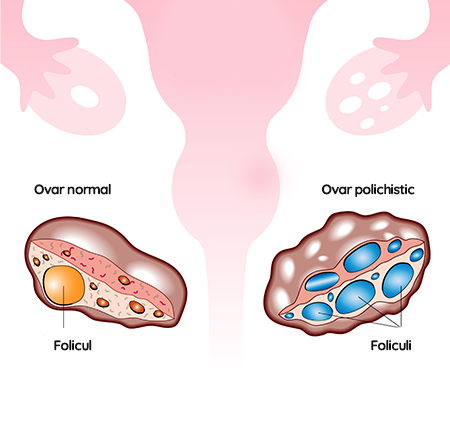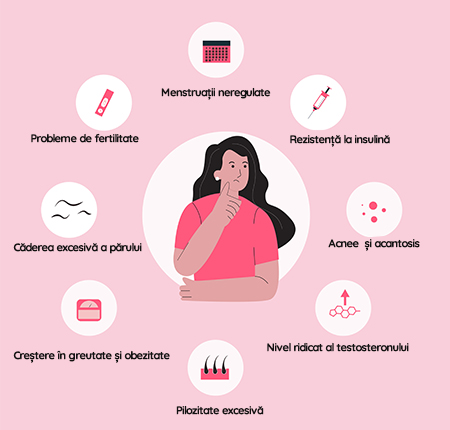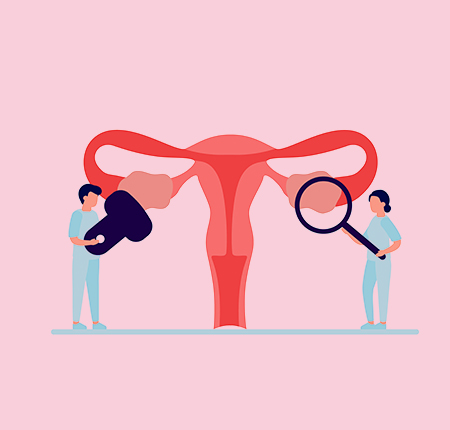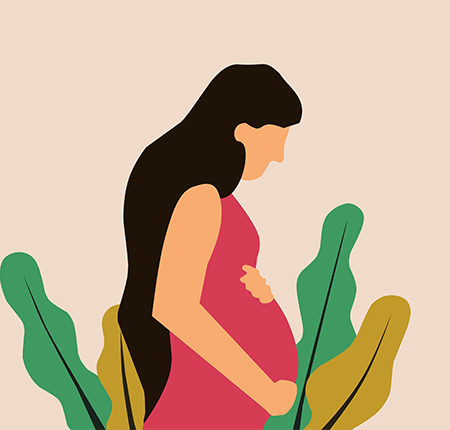
Polycystic ovary syndrome (PCOS) - What does it mean & how is it treated?
Polycystic ovary syndrome (PCOS) is the most common cause of infertility in women. during the reproductive years. This problem is an endocrine disorder associated with irregular periods, higher production of male hormones and other complications. If left untreated, polycystic ovaries can lead to serious conditions, including infertility. Today we learn everything from causes to symptoms and treatment.
What does polycystic ovaries / PCOS mean?
Polycystic ovary syndrome, also known as PCOS, is a condition in which the ovaries produce an abnormal amount of male sex hormones, usually present in small amounts in women.
Ovulation occurs when a mature egg is released from an ovary. This happens so that it can be fertilized by a male sperm. If the egg is not fertilized, it is sent out of the body through menstruation. In the case of polycystic ovaries, they do not produce enough hormones to ovulate and this leads to the problems associated with PCOS.
As a result of the fact that ovulation does not take place, small cysts appear on the surface of the ovaries, formations that are actually small bags of liquid, small in size (diameter less than 1 cm). The lack of ovulation also explains the irregularities of the menstrual cycle, the main symptom of PCOS.

Polycystic ovaries - Symptoms
The symptoms in the case of this condition are often variable or absent, and their onset is specific to the age of puberty. Clinical manifestations include:
Irregularities of the menstrual cycle, with the occurrence of menstruation at intervals of more than 35 days or even the complete absence of menstruation
Fertility problems
Acne
Hirsutism (hair growth in specific male areas)
Weight gain, with fat deposition in the abdominal area
Acanthosis nigricans (black spots on the skin of the armpits and neck)
Alopecia (loss of hair in specific male areas, baldness)
Depression, anxiety
Pelvic pains
DISORDERS
Sleep disorders

Menstruation with polycystic ovaries
At the onset, the symptoms of the condition are mild, but with time they intensify. For a woman, it is important not to ignore the signals she receives from her body, nor to look for unjustified explanations for the symptoms she presents. An irregular menstrual cycle, with heavy bleeding, or the complete absence of menstruation can represent a real problem.
Whether you're dealing with a problem like PCOS or not, you know that health is synonymous with taking care of yourself. When you take care of your body and the products you use, even menstruation doesn't stop your life. Created by women for women, Enroush products put your health and the health of the planet first, with every tampon, absorbent pad, menstrual pad being organic, made from 100% natural ingredients. Now you can really choose products that value your health as much as you do. 
Polycystic ovaries - Causes
The exact causes responsible for the appearance of polycystic ovary syndrome have not yet been identified. There are, however, several factors that may be associated with genetic predisposition, specific environmental factors, and endocrine disorders.

Insulin resistance
Insulin is a hormone produced by the pancreas to control the amount of sugar in the blood. Insulin resistance means that the body's tissues are resistant to the effects of insulin, and the body must produce extra insulin to compensate. High insulin levels cause the ovaries to produce too much testosterone which interferes with the development of follicles (the sacs in the ovaries where eggs develop) and prevents normal ovulation.
Hormonal imbalance
Many women with PCOS experience a hormonal imbalance, but the exact reason why these changes occur is not known. Studies in the field suggest that the problem could start in the ovary, other glands that produce hormones, or even in the part of the brain that controls their production.
Genetics
One of the first causes that is analyzed during a visit to the doctor for such a problem is family history. That's because if someone in your family, your mother, sister, aunt, suffers from PIL, the risk of developing it too is often increased.
When should you go to the doctor?
If you are worried about your period, if you have fertility problems or if there are signs of a hormonal imbalance, it is time to consult your doctor. Any of the previously mentioned symptoms can represent a first alarm signal for you.
Don't put off going to the doctor and schedule a consultation whenever you feel the need. 
Polycystic Ovary Syndrome (PCOS) diagnosis
The diagnosis of PCOS is established by the gynecologist based on the patient's history and clinical examination, but also on imaging investigations and laboratory analyses.
In the first phase, the gynecologist will ask the patient some questions about the menstrual cycle (their frequency, if there are periods when menstruation was absent, if there were changes in the menstrual flow). He will then perform a brief clinical exam to check the patient's weight and determine if it is within the recommended limits.
Confirmation of the diagnosis will be made with the help of imaging investigations, more precisely through a transvaginal ultrasound. Thus, the doctor will be able to confirm or not the presence of microcysts on the ovaries. At the same time, a series of blood tests will be recommended to check the patient's hormone level.
The difference between micropolycystic and polycystic ovaries
Polycystic ovary syndrome is a disorder characterized by multiple cysts appearing on the surface of the ovary, but also by an increase in excess male hormones. PCOS is considered a rather serious pathological phenomenon, but micropolycystic ovaries are simple benign conditions that are most often found accidentally during an ultrasound scan performed for another problem.
Polycystic ovary syndrome - Treatment
Polycystic ovary syndrome treatment is not mandatory and, when recommended and administered, can vary considerably depending on certain factors, such as age, other associated pathologies, desire to conceive in the near future.
Medicines for polycystic ovaries
Drug treatment includes oral antidiabetics to decrease insulin resistance and sensitize tissues to its action, as well as the secondary decrease in testosterone levels with favoring ovulation.
As an alternative, the doctor can also prescribe contraceptives, used during puberty and adolescence, to control the menstrual cycle, regulate male hormones and reduce acne.
Operation / Surgical treatment
A minor surgical procedure called laparoscopic ovarian drilling may be a treatment option for fertility problems associated with PCOS, especially if medications have not worked. Under general anesthesia, the doctor treats the ovaries using heat to destroy the tissue that produces male hormones. This corrects the hormonal imbalance and can restore normal ovarian function.
Laser treatment of polycystic ovaries
Carried out under the same conditions as the treatment described above, the laser treatment requires that certain portions of the ovary be cauterized with the help of electrocautery or laser. The procedure, usually performed laparoscopically, involves making 4-20 punctures (3 mm deep and wide) in each ovary to facilitate ovulation.
Polycystic ovaries can be treated with natural treatment
If, after a medical examination, you have decided together with the doctor that you do not need, or do not prefer, any of the previously mentioned treatment options, you can adopt some good practices. A healthy diet and more physical activity can facilitate weight loss and reduce the symptoms associated with PCOS. In this way, you also help your body use insulin more efficiently, lower blood glucose levels, and may also help ovulation.
Polycystic ovaries in pregnancy
If you are pregnant and dealing with polycystic ovary syndrome, there are some risks that you should be aware of. These include: arterial hypertension, preeclampsia, gestational diabetes and miscarriage. These risks are especially high for overweight women.

Complications of Polycystic Ovaries
The inability of the ovaries to release eggs at regular intervals causes difficulty in getting pregnant. Many women receive the diagnosis of polycystic ovary syndrome after medical investigations are carried out to elucidate the reasons why they cannot conceive.
But, untreated, over time PCOS seriously alters the quality of life of women and complications such as:
Diabetes mellitus/gestational
Heart conditions
High blood pressure
High cholesterol level
Increases the risk of stroke
There is a risk of miscarriage
Infertility
Depression, anxiety and eating disorders
What can you do if you face PCOS?
Some women suffer from physical symptoms of PCOS, such as weight gain, hair growth, and acne. For such problems, cosmetic treatments such as laser epilation can help you feel better about your appearance. Often times, talking to your doctor about the best ways to treat the symptoms that are bothering you can help more than you think. Ask questions and look for solutions and step by step it will be easier.
Frequently asked questions
What is the best treatment for polycystic ovaries?
Since the need for and type of treatment varies from person to person, there is no universally valid treatment for polycystic ovary syndrome. Most of the time, the doctor will recommend one of the treatments we talked about earlier.
What foods are prohibited when you have polycystic ovaries?
Refined carbohydrates cause inflammation in the body, increase insulin resistance, and should therefore be avoided or consumed as little as possible. This food group includes: white bread and any other white flour product, muffins, cookies, various commercial cakes, pastries, any dessert, crisps.
Fiber-rich foods are recommended instead because they help fight insulin resistance by slowing digestion and reducing the impact glucose has on the blood.
If you have polycystic ovaries, can you get pregnant?
The good news is that a specialist doctor can make recommendations about the treatment to be followed to release the eggs needed for fertilization and to increase the woman's chances of becoming pregnant. There is no recipe for success, but there are many methods a woman can try to get pregnant.






















